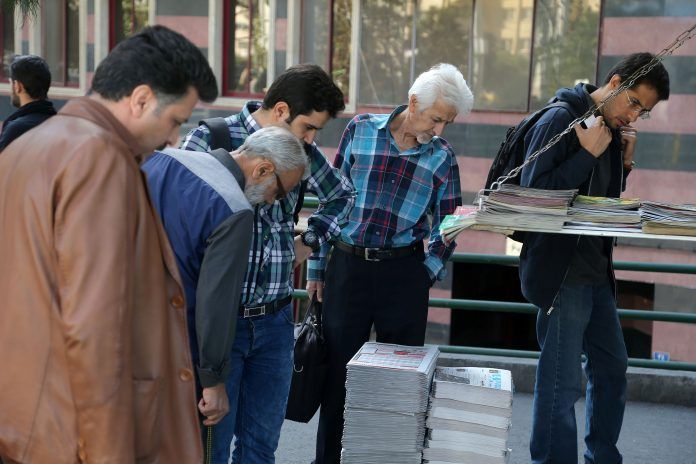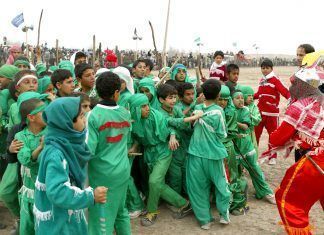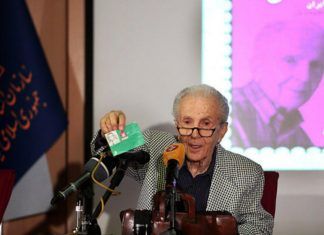The Journalists Association of Tehran Province has released a statement accusing Iran’s state print and broadcast media of being complicit in the coverup on the crash of a Ukrainian passenger plane, which was shot down by the Islamic Revolutionary Guards Corps (IRGC) forces on January 8, killing all 176 people on board.
The Islamic Republic of Iran Broadcasting (IRIB) and state print media and news websites failed to question the government’s initial claims that technical failure had caused the plane to crash and instead toed the party line by accusing Western intelligence of disseminating misinformation about Iran.
Days after the incident, Iran finally admitted that its military had “unintentionally” shot down the plane shortly after it took off from Tehran’s Imam Khomeini International Airport. The announcement only came after footage posted on social media showed the exact moment that a surface-to-air missile hit the Ukrainian Boeing 737.
“Media reported widely on the crash of a Ukrainian passenger plane that resulted in the tragic death of all Iranian and foreign nationals on board, including many bright academics and scientific minds. However, what emerged in the three days following the crash showed that Iranian society has no defense against the media,” the statement said. “Military and missile attacks are not the only danger facing our society. The greatest threat to our nation is the lack of an independent and free media that holds the state and its officials accountable and finds real answers for the public on important issues.”
[aesop_image img=”https://kayhanlife.com/wp-content/uploads/2020/01/Iran-air-crash.jpg” panorama=”off” credit=”REUTERS./” align=”center” lightbox=”off” captionsrc=”custom” captionposition=”left” revealfx=”off” overlay_revealfx=”off”]
“Covering up the truth and publishing lies delivered a massive blow to the public’s trust. It further weakened the already tenuous position of media in our society,” the statement noted. “Even the IRIB admits that it has a credibility problem. We must, however, point out that the state and other domestic news outlets started losing the public’s trust a long time ago. The difference is that while most media warned about the pending crisis, the IRIB defended the status quo. The situation shows that people do not trust official media outlets. Journalists must do their utmost to fill this vacuum.”
“Media outlets are loudspeakers that inform the public about what state officials do,” the statement argued. “Efforts by officials to hide information do not free the media from its responsibility to discover and report the truth. The media cannot always wait for officials to disclose information, which means the state must take steps to protect journalists.”
“The Iranian people woke up to a series of disgraceful headlines on newsstands which described the shooting down of the [Ukrainian] airliner by missiles as a conspiracy,” the statement said. “On the same day, other sources published statements by President [Hassan Rouhani] and the [Islamic Republic of Iran] Army, admitting that missiles had brought down the plane.”
“We are watching the burial of the public’s trust. The first coffins hold the corpses of state media, including the IRIB, the press, and websites,” the statement added. “This completes the transfer of power to unofficial and unprofessional media sources outside the country.”
The statement concluded: “We call on all of our colleagues to disregard the usual illegal restrictions and return to their investigative methods while gathering information, reporting the news, and analyzing their findings. We hope that the esteemed managing editors of press and websites ignore illegal limitations and publish the news following the law and free from outside pressure.”
Kayhan London published three tweets by journalists working for domestic media outlets on the dissemination of incorrect information about the cause of the crash of the Ukrainian passenger plane.
Pedram Alvandi, a reporter for the Islamic Republic News Agency (IRNA), tweeted: “All our sources stressed that missiles played no role in bringing down the plane. While some did not have any information, others covered it up. We reported the news based on the information we had available to us. I am sorry about this mistake. I apologize to everyone who has been hurt because of this. Neither I nor any of my colleagues have intentionally published misinformation in the past few days. However, I apologize to everyone who relies on IRNA for their news and information.”
Mohammad Mobin, the managing editor of the Tehran-based Borna News Agency, tweeted: “This is a difficult time for people in the media. We are wrestling with our painful thoughts, guilty consciences, and useless pens. As the managing editor of Borna News Agency, I apologize to the grieving families, and all our readers for publishing lies that we were given as real news and information.”
Another journalist, Hesamuddin Ghamous Moghadam, tweeted: “The missile was fired at domestic media, the public’s trust, national security, and interests. It killed innocent people and our beliefs. I have received many personal insults since yesterday. Make no mistake; this is Twitter. I will write less to make fewer mistakes.”
[Translated from Persian by Fardine Hamidi]





